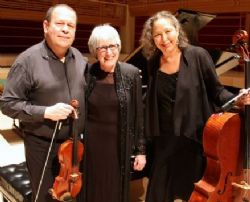|
Symphony
FROM THE NEW WORLD TO THE OLD WORLD
by Peter Lert
Saturday, June 14, 2025
Chamber
MC2 DUO RECITAL CLOSES 222'S SEASON
by Terry McNeill
Saturday, June 14, 2025
Choral and Vocal
CANTIAMO SONOMA'S LUSCIOUS A CAPELLA SINGING IN SEASON ENDING CONCERT
by Pamela Hicks Gailey
Sunday, June 8, 2025
Symphony
SRS SEASON ENDS WITH RESOUNDING TA-TA-TA-BANG
by Terry McNeill
Sunday, June 1, 2025
Symphony
YOUTHFUL VIRTUOSITY ON DISPLAY AT USO'S MAY CONCERTS
by Peter Lert
Saturday, May 17, 2025
Symphony
MYSTICAL PLANETS AND LIVELY GERSHWIN ORTIZ AT FINAL SRS CONCERT
by Peter Lert
Sunday, May 4, 2025
Symphony
VSO'S CONCERT MUSIC OF TIME, MUSIC OF PLACE
by Peter Lert
Sunday, April 27, 2025
VOCAL ELEGANCE AND FIRE AT THE 222'S RECITAL APRIL 26
by Pamela Hicks Gailey
Saturday, April 26, 2025
CANTIAMO SONOMA SINGS AN INSPIRED GOOD FRIDAY MOZART REQUIEM CONCERT
by Pamela Hicks Gailey
Friday, April 18, 2025
DRAMATIC SHOSTAKOVICH SYMPHONY CLOSES PHILHARMONIC'S 25TH SEASON
by Terry McNeill
Sunday, April 13, 2025
|
 |
 Romasevich, Thompson and Brindel |
A BRUCH SURPRISE IN TRIO'S SCHROEDER CONCERT
by Terry McNeill
Sunday, October 26, 2014
Part of the Trio Navarro’s sterling reputation rests with the rare repertoire they perform. So it was a bit of a surprise Oct. 26 in Schroeder Hall when they programmed popular works by Beethoven and Rachmaninoff. Somehow Max Bruch pieces managed to sneak into the mix.
The Bruch in a way stole the show. Four selections were played from a work transcribed from the original Op. 83 for viola, piano and clarinet. The Navarro performed Nos. 2, 5, 6 and 7, all in a minor key save for the last. In the opening B Minor part, cellist Jill Rachuy Brindel and pianist Marilyn Thompson gave the music a surging darkness that carried over to the next part (Andante) in F Minor. This music was way out of fashion when composed in 1910, and there is no hint of Dvorak, Rubinstein or Tchaikovsky, but sporadically fleeting Schumann harmonies are heard.
The common thread in the Bruch is lush romanticism, and the Trio’s performers alternated stating the theme in the G Minor “Night Song.” Violinist Victor Romasevich’s tone is not especially rich in harmonics, but it is penetrating, and he never covers the cello line.
The concluding B Major Allegro alternated light-hearted rhythms that at times turned dark and demanding. With only 80 people in a hall seating 250, some piano runs were acoustically muddy, though the string sound was always direct and vivid.
Composed in 1811, the Beethoven B Flat Trio of Op .97 (Archduke) comprised the entire second half, and the Navarro gave it a dramatic and spacious reading. Ms. Thompson started the initial Allegro at a fast clip, and the Navarro played the iconic work in a thoroughly modern style, eschewing the heart-on-sleeve approach of past performances by trios such as Cortot, Thibaud and Casals. In the lovely Andante Cantabile, the music was a question-and-answer of plaintive voices, with Ms. Brindel’s resonant cello baritone sounding out strongly in the hall.
Rachmaninoff’s G Minor Trio (“Élégiaque”) opened the concert, an early work from 1892 that has all the seeds of the composer’s ambrosial harmonies in the later cello sonata and the famous concertos and symphonies. Again Ms. Brindel had a starring role, trading dramatic outbursts with Mr. Romasevich’s energetic violin part.
As might be expected from the great pianist-composer, the piano sound could be dominant, though Ms. Thompson attentively worked to balance her sonority with that of the ensemble.
This concert gave me no reason to alter a long-ago observation that the Trio Navarro is the finest resident classical music trio in Northern California.
|
